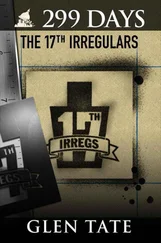Glen Tate - 299 Days - The Preparation
Здесь есть возможность читать онлайн «Glen Tate - 299 Days - The Preparation» весь текст электронной книги совершенно бесплатно (целиком полную версию без сокращений). В некоторых случаях можно слушать аудио, скачать через торрент в формате fb2 и присутствует краткое содержание. Город: Augusta, ME, Год выпуска: 2012, ISBN: 2012, Издательство: PrepperPress, Жанр: sf_postapocalyptic, на английском языке. Описание произведения, (предисловие) а так же отзывы посетителей доступны на портале библиотеки ЛибКат.
- Название:299 Days: The Preparation
- Автор:
- Издательство:PrepperPress
- Жанр:
- Год:2012
- Город:Augusta, ME
- ISBN:978-0615680682
- Рейтинг книги:3 / 5. Голосов: 1
-
Избранное:Добавить в избранное
- Отзывы:
-
Ваша оценка:
- 60
- 1
- 2
- 3
- 4
- 5
299 Days: The Preparation: краткое содержание, описание и аннотация
Предлагаем к чтению аннотацию, описание, краткое содержание или предисловие (зависит от того, что написал сам автор книги «299 Days: The Preparation»). Если вы не нашли необходимую информацию о книге — напишите в комментариях, мы постараемся отыскать её.
299 Days: The Preparation
299 Days: The Preparation — читать онлайн бесплатно полную книгу (весь текст) целиком
Ниже представлен текст книги, разбитый по страницам. Система сохранения места последней прочитанной страницы, позволяет с удобством читать онлайн бесплатно книгу «299 Days: The Preparation», без необходимости каждый раз заново искать на чём Вы остановились. Поставьте закладку, и сможете в любой момент перейти на страницу, на которой закончили чтение.
Интервал:
Закладка:
In these tough times, the government employee unions demanded more money. They insisted on pay raises. They even wanted more for their gold-plated pensions. They said that with the losses in the stock market that had previously paid the interest on their pensions, the state must put in more money so they would not suffer a decline in pension payments. In the mind of government employee unions, the taxpayers needed to pay more to them so they wouldn’t suffer any losses from the stock market — like all the taxpayers had. The Legislature and Governor, all elected with the money donated by the unions, were happy to do so. The voters, at least enough of them to swing an election, seemed to be OK with it. Actually, voters in the largely agricultural eastern half of the state were not OK with it. But the conservatives in Eastern Washington were just a small part of the population, so they didn’t count when it came to politics. Most voters in Washington State had been told for several decades how underpaid public employees were (which was no longer true), so many of them thought the recession was a chance for the unions to “catch up” with the private sector on pay and benefits.
Of course, with unemployment going up, the government scrambled to create more “safety net” programs. State unemployment benefits were increased. The federal government was handing out several billion dollars in aid to the state. That would allow all this spending without any consequence. For a while, until eventually even the feds realized they couldn’t keep shoveling money to the states and started cutting back on aid. Now what? The state budget deficit would be about half of all the money they had control over. About half of the state budget was spent on federally mandated things like Medicaid, and the state portion of other entitlements that couldn’t be cut. Half of all the money? No more federal money and no more accounting gimmicks. The state had to, for the first time ever, actually consider cutting.
State workers were asked to take furloughs, which was a week or two off each year without pay. “Essential” services, about 40% of the employees, were exempt from the furloughs.
Union representatives responded as if state workers were being executed in the streets. They ginned up huge protests and angrily demanded a stop to the cuts. Most people in the dwindling private sector looked on in amazement. They had either been laid off or knew plenty of people who had, but these government employees were going nuts over taking a tiny pay cut.
Instead of making real cuts, the government demanded more money. It raised every tax it could. It started charging “user fees” for the most absurd things. Every government permit — and there were hundreds of them needed to conduct daily life — came with a price tag. Registering a car now had a new fee of several hundred dollars. Fire departments started to charge to respond to 911 calls. Counties started to require inspections of appliances to ensure they were energy efficient and charged a hefty “inspection fee.” Cities started charging a license fee to owners of dogs, threatening to take unlicensed dogs and euthanize them. It was like the government thought it was entitled to as much of the people’s money as it demanded. Grant remembered the meeting at the Governor’s Office when they said exactly that.
But the people, for the most part, just stood by and watched. They didn’t want to get involved. A surprisingly high number of them were getting government money in one form or another. Almost half of households were dependent, in whole or in part, on government benefits. They wanted to keep theirs.
The rest of the people who weren’t getting government benefits didn’t want to rock the boat because they didn’t want to be “extremists” or be called “greedy.” Besides, they had enough to eat (actually, too much, in most cases), there were plenty of good reality shows on TV, and they didn’t really understand politics, anyway. All they knew is what they learned in school: government needed more money to do great things for the little guy and business was greedy.
People assumed that the WAB would be looking out for big business. Not true. Big business and small business had radically different interests. Big business could get the government to write regulations and tax laws to put their small-business competition out of business. Big business was run by CEOs who, by and large, were products of the liberal education system and the Seattle cocktail party circuit where one chats about how awful Republicans are.
Small business, on the other hand, actually wanted government to be limited. The taxes, regulations, and stupid paperwork requirements were killing them.
Big business and government got even cozier during the “recession.” At the federal level, the Administration, with ample help from the Republicans, bailed out GM, Chrysler, AIG, Goldman Sachs, and just about all the other big corporations.
The same was true at the state level, but the help was in different forms. Big business in Washington State got all kinds of state contracts for “stimulus money” projects to build roads and government buildings, and to buy many things big business sold. For example, the big car dealers’ association got the state to buy millions of dollars of “fuel-efficient” cars for the state motor pool, which didn’t actually need any new cars. Big business returned the favor, donating almost all their corporate contributions to the ruling Democrats and the few Republicans in office. Big business would help the politicians in other ways, like PR stunts disguised as meetings between business leaders and the Governor with the business leaders praising the Governor. The state returned the favors by imposing requirements on businesses that only large employers could afford to comply with, thus reducing the number of small businesses and thereby reducing the competition big businesses faced.
This was soft fascism; government and large corporations helping each other to the detriment of everyone else. It was still fascism though — just without the little mustache and the genocide.
“Are we the only ones who see what’s going on?” Grant asked Brian one day.
Brian sighed. “Pretty much. Most people don’t know or care what’s going on. They’re pathetic. But they’ll get what they deserve.”
Grant decided to have “the conversation” with Brian.
“You know, Brian, this whole thing is going to come crashing down,” he said. “Soon, too. Maybe a year, maybe five. But, soon.”
Brian looked relieved. Finally someone was saying what he was thinking, but he thought it was too outlandish to say out loud. “I know,” Brian said. “The government is out of money and they can’t stop spending. The only thing that will stop them is bankruptcy. It’s going to get ugly.”
They talked about the civil unrest that would come from the cuts and the protests of all the people dependent on government money. They talked about how the government would crack down on dissenters like them. Not haul them off or anything, just start auditing their taxes and that kind of thing. Soft fascism; not the little mustache stuff.
Grant didn’t tell Brian about the preparations he had been making. It wasn’t time yet. But he did say to Brian, “If things get crazy, we need to stick together. You, me, Tom, and Ben and our families.”
Brian nodded, solemnly. He couldn’t believe they were having this conversation, but he was glad they were.
Chapter 30
Foreign and Domestic
Grant had two ARs; the standard A2 and his customized M4. What to do with the A2? Having two ARs was important. There was a phrase among preppers that “one is none and two is one,” meaning that a backup is always necessary.
Читать дальшеИнтервал:
Закладка:
Похожие книги на «299 Days: The Preparation»
Представляем Вашему вниманию похожие книги на «299 Days: The Preparation» списком для выбора. Мы отобрали схожую по названию и смыслу литературу в надежде предоставить читателям больше вариантов отыскать новые, интересные, ещё непрочитанные произведения.
Обсуждение, отзывы о книге «299 Days: The Preparation» и просто собственные мнения читателей. Оставьте ваши комментарии, напишите, что Вы думаете о произведении, его смысле или главных героях. Укажите что конкретно понравилось, а что нет, и почему Вы так считаете.











